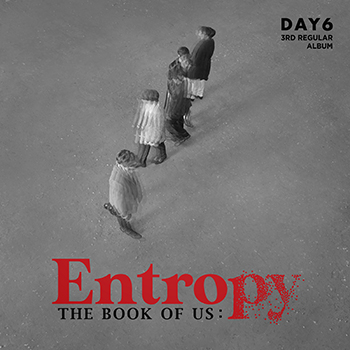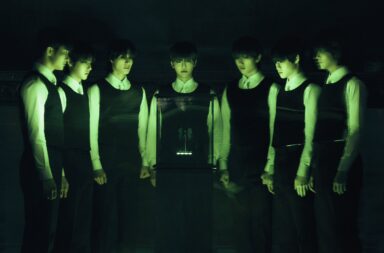
The devil may work hard, but Day6 definitely works harder. The band released their third full length album, The Book of Us: Entropy, with 11 tracks in a variety of music styles. This release comes in the midst of their ongoing world tour, Gravity, and simultaneous with their Japan pre-release, “Finale.” The album title carries on from their earlier release, The Book of Us: Gravity. Beyond the obvious reference to scientific terms, entropy comes off as a strange concept to pick for a K-pop album, though there is certainly good reason for it. Day6 has cleverly chosen a framework within which they can produce songs in any genre and form they like, with the album jumping from electronic disco to emo rock to Latin music to California metal in the first half, and later rock ballads to soul and even to Reggae in the second half.
For those unfamiliar with the term entropy, it would be easiest to think of it as a measure of disorder within a particular system, where heat energy is transferred from a point of higher temperature to a point of lower temperature to achieve an eventual equilibrium or sameness in energy levels. Day6 interprets this concept along various threads in the construction of their album.
One of the interpretations offered by the band themselves during their showcase was in reference to the tracks listed on two pages, “Side A” and “Side B” respectively, in the album. Songs in the first half, “Side A,” are upbeat and pulsating, whereas the “Side B” songs are melancholic and distant. Categorised as hotter and cooler songs, the concept of entropy comes through as a bridging factor in the broad music palette that Day6 presents to their listeners; they are capable of evoking a spectrum of emotions through their craft. Of course, another easy interpretation of the concept would be Day6’s ability to channel their energy to their listeners and especially live audiences.
However, the more interesting way of reading this disorder that the band has proposed is how it offers them the liberty to present diversity within a K-pop landscape that often focuses on a single aesthetic. Girl groups go through phases of cutesy concepts (think Twice’s “Yes or Yes” or “Cheer Up”) to sexy and hip hop or even a more focused theme like retro (Wonder Girls’ “I Feel You” is a good example). Boy groups have the same phase transitions, whether it is BTS‘s hip hop debut to their more matured Wings or SHINee’s spectrum of cute and endearing (“Hello”) to edgy (“Lucifer”) or thematic (“Sherlock”). Even Day6’s former albums like Remember Us: Youth Part 2 and Shoot Me: Youth Part 1 toy with specific genre styles of retro synth-pop and punk rock influences respectively.
The Book of Us: Entropy smashes the notion of consistent artistic style in the conventional sense, birthing a concept of diversity as aesthetic and adaptation as artistry. The songs across this album synthesise the music experimentation the band has engaged with in their past compositions and give nods to the intricacies of genre constructions. A song like “Deep in Love” has resonances of the synth use in “Days Gone By,” with the rock influences evident in the guitar solo and chanting that appeared in the chorus and bridge of “Shoot Me.” This conflux of techniques and mixing of genre influences speak volumes about the band’s ability to adapt stylistic elements into their own sound.
Being the connoisseurs of music that they are, Day6 acknowledges the variance even within a genre like rock. The title track, “Sweet Chaos,” has a heavier bass and drum focus, sounding like something off a Panic! At the Disco album, bordering on emo rock. In comparison, “Stop Talking,” from the colder second half, is a more familiar pop rock Day6 tune with a no-nonsense attitude as it brushes off criticisms through its lyrics.
These tracks are starkly different from “Rescue Me,” a song that pays homage to metal bands. The pulsing electric guitar strumming and distortions, as well as intense vocal delivery are all characteristic of metal music. They even included a guitar solo to the effect. All these then distinct themselves from the theatricality of “Not Mine,” with its orchestral strings opening that later bridges into an electric guitar focused instrumental break mid-song. “Not Mine” presents yet another facet of the genre, coming closer to punk rock’s dramatic darker shades and brings to mind J-Rock sounds similar that of ONE OK ROCK.
Between all that rock variations, Day6 slots in “EMERGENCY,” an intriguing upbeat track that lies closer to pop than hardcore head-banging music. The inclusion of brass within the melody and regular beats make the song an amusing bop, one that pulls out images of aerobics exercise videos somehow. As Young K repeats, “Breathe in and out and in and out and out,” it is as though the band is trying to regulate their listener’s heartbeat to prevent heart palpitations from all that intense rock music.

However, before one can make a generalising statement about the album being an exploration solely into rock music, Day6 throws songs like “365247” and “OUCH” onto the table. The former is a Reggae and Latin pop styles tune, and the latter is a Bossa Nova track. Drawing influences from South American music, the album begins to diverge away from rock-based sounds the band has delved into before.
The brilliance of Day6 then comes in how these songs remain identifiably Day6, rather than becoming an echo of “Despacito.” The airy vocal delivery of “Getting redder” and “Getting hotter” in “365247” that floats over the deeper main vocal line in the pre-chorus are characteristic of the band. Similar vocal constructions can be found in the ad-libs of “Wanna Go Back” and chorus of “Feeling Good.” Subtle as these vocal techniques and compositions might be, there is a Day6 sound that has unconsciously seeped into regular listeners of their music.
Perhaps the only shortcoming of the album would be the diversion of attention away from the lyrics due to the prominence of stylistic shifts in the melodies. Arguably, the selection of tunes in different genres is appealing to an international audience; there is something for everyone. However, it is a pity that the lyrics to a song like “OUCH” gets buried in the face of its more eye-catching Bossa nova melody. The comedic caricature presented in the verses is lost, when in fact these lyrics add a certain grovelling pitifulness and amusing pettiness to the song:
Your words, “You didn’t shave today too.”
They sting me so.
“I promise I will next time.”
How many times have I said this?
To your words, “Did you just wake up before coming?”
I answered, “No, I washed up as best as I could
I promise I’ll be more attentive next time.”
How many times has this been said?

Pushing the limits of cohesiveness with all that musical toying, the album comes to a satisfying close with a genre I personally feel they have mastered – the rock ballad, especially with Young K’s lyrical brilliance. “Not Fine” deserves a special mention as it spotlights a situation hardly found in Day6 songs. The band has conveyed melancholy and resignation beautifully in the past, with songs like “I Smile” or “Letting Go.” At the other end of the emotional spectrum, they excel with joyful hits (“Dance, Dance,” “Sing Me,” “Freely”) and feature the indignation of heartbreak (“Shoot Me”). They even do great at offering consolation and gratitude with “I’ll Try” and “Beautiful Feeling.” Yet, “Not Fine” expresses a moment of uncertainty and helplessness rare for a good-intentioned and articulate band like Day6. The desperation to figure out how to salvage a gradually diminishing romance comes through in Sungjin’s familiar belting that opens the chorus. There is an emotional dilemma the band hardly spotlights, allowing this song to evoke a strange and new sort of pang in the heart.
Nonetheless, “Like a flowing wind” has to take the crown for being an epitome of Day6’s sound, allowing listeners to return back to a place of comfort and familiarity at the album’s end. The song begins with the skeleton melody of Wonpil on the keyboards, directing attention to the lyrics being sung:
Like the flowing wind,
I will never be able to catch you even if I try
In the gaps between my five fingers,
You fell through, flowing away somewhere, far, far away
The vocals take main stage and the spotlight is back on the distinct vocal colour of each member and poeticism of the lyrics. It is this diversity within the group that allows a song to be filled with textures while delivering these pensive lyrics. As the instrumentals take a backseat in this final track, Day6 uses their vocals to comfort and embrace their listeners. Another leg of their journey has come to a close like a wistful and quietly passing breeze.

The album may have kicked off by screaming innovation and rule-breaking, but it ends with an assurance that Day6 remains the band loved for their unique tinge of melancholy and relatability. The album is entropic in the sense that it can appear chaotic and disorganised, but only in service of artistic liberty and innovation. It conveys the chosen concept of entropy in how the band lifts listeners up and brings them down depending on the song being played; they engender a sameness of emotions and energy levels through their artistry. If their previous albums had been experiments into various new music forms, The Book of Us: Entropy is a synergetic explosion of everything they had ventured into. Much less bounded by genre conventions or industry expectations, Day6 has proven that disorder is preferable because it means freedom to express and to feel, a “Sweet Chaos” to be savoured in this long road of music making.
(Britannica, Muusic, V Live, YouTube. Images via JYP Entertainment)




